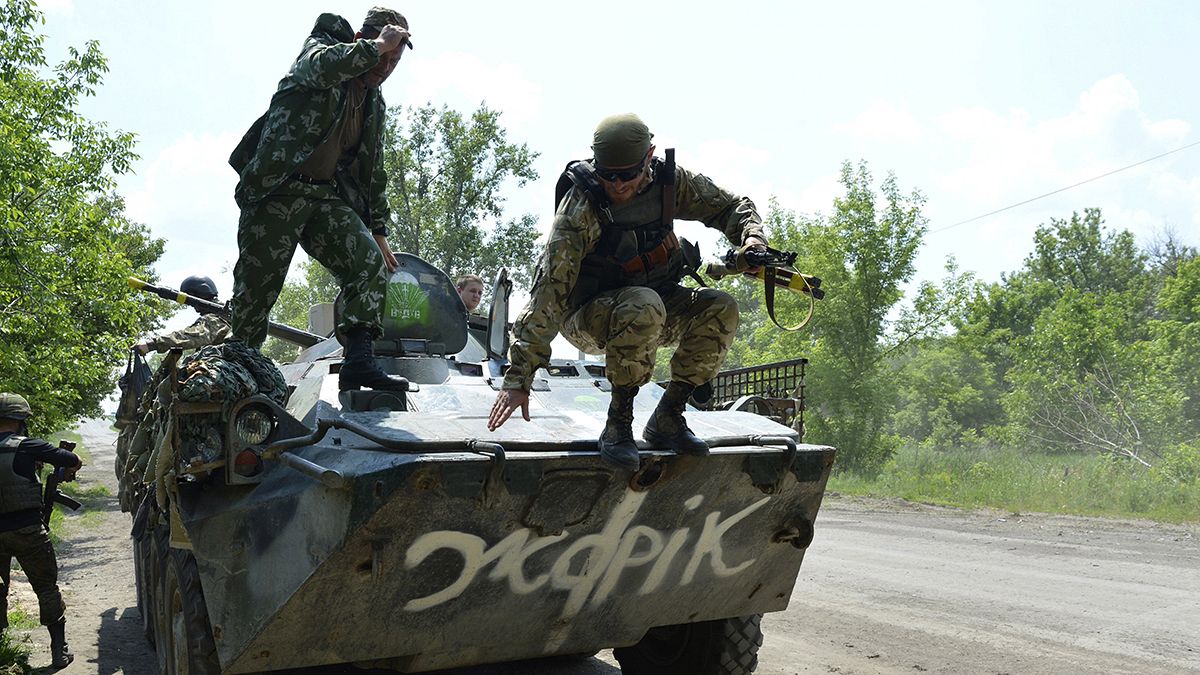Ukraine has seen its worst fighting since February, with President Poroshenko warning of a huge threat of Russian military operations. The UN Security Council is to hold an emergency session on Friday
The sudden upsurge in fighting in eastern Ukraine has prompted the UN Security Council to call an emergency meeting on Friday, with the Minsk ceasefire accord in danger of collapse.
Army units have been on the move after some of the worst violence around the government-held town of Maryinka.
Ukraine blames pro-Russian separatists for launching an offensive to try to take the town on Wednesday, sparking a 12-hour battle.
The claims were given strong backing by international monitors from the Organisation for Security and Cooperation in Europe (OSCE) who reported movements of heavy weaponry in rebel-held areas.
“We were not able to get close to the fighting,” said OSCE spokesman Michael Bociurkiw. “The important thing that we are able to say is that there was intense fighting. The main point here is that the Minsk accords were broken, these are clear violations of the ceasefire, and not only that, violation in terms of the movement and use of heavy weaponry.”
The observers said they tried repeatedly to contact leaders of the self-proclaimed Donetsk People’s Republic, but “either they were unavailable or did not wish to speak to the SMM (Special Monitoring Mission)”.
Read what
OSCE_SMM</a> saw yesterday. SPOT REPORT: Fighting around <a href="https://twitter.com/hashtag/Marinka?src=hash">#Marinka</a> <a href="http://t.co/5s1TpF2UjE">http://t.co/5s1TpF2UjE</a> <a href="https://twitter.com/hashtag/ukraine?src=hash">#ukraine</a></p>— Michael Bociurkiw (mikeybbq) June 4, 2015
The separatists denied the accusations that they had launched an offensive. They updated their casualty toll around Maryinka to 21 dead – five civilians and 16 fighters – and blamed Ukrainian forces for indiscriminate shelling of populated areas.
Earlier, Ukrainian military officials said that five Ukrainian servicemen had been killed and 39 wounded in the fighting around Maryinka, which lies just over 20 kilometres west of the rebel stronghold of Donetsk.
The European Union has denounced what it is calling the “most serious violation of the ceasefire” in eastern Ukraine since February.
The EU’s executive Commission has called on all sides involved to respect the Minsk peace accord, recalling that the easing or tightening of sanctions against Russia depends on the deal being respected.
Meanwhile in Kyiv Ukraine’s president defended the military’s action in the Maryinsk area. In his annual speech to parliament, Petro Poroshenko said the armed forces’ response was legitimate defence.
“We warned the international partners, brought the artillery back from the place where it was located in accordance with the Minsk Agreement and defeated the attack of Russian soldiers. They were stopped by the power of Ukrainian armed forces and by international solidarity, as international society condemned the violation of the Minsk agreement,” Poroshenko said.
The president also gave one of his starkest warnings yet over Russian intervention, saying the military must prepare for a possible full-scale invasion by Russia.
There was a “huge threat” that Russian terrorist groups would resume large-scale operations, Poroshenko said. “Fourteen Russian battalion tactical groups of more than 9,000 soldiers are currently in Ukraine. The concentration of the Russian military near the state border is one and a half times higher than a year ago.”
Moscow has blamed Kyiv for provoking new fighting to put pressure on the European Union, which is due to decide on whether to extend economic sanctions against Russia soon.
“The Ukrainian side has taken steps to aggravate tensions many times in the past in the run-up to some major international events. This used to happen and we are seriously concerned now over the most recent manifestation of such activity,” Kremlin spokesman Dmitry Peskov told journalists.
Russian Foreign Minister Sergey Lavrov said the Minsk agreements were continuously threatened with failure because Kyiv was avoiding dialogue with the Donbass region.
Euronews correspondent in Kyiv Maria Korenyuk said:
“According to Petro Poroshenko, Ukraine will begin a political dialogue with the Donbass region immediately after local elections, due to take place on October 28. But post-war reconstruction of the region and restoration of economic ties with Donbass will only take place after Ukraine regains absolute control of its external borders.”


